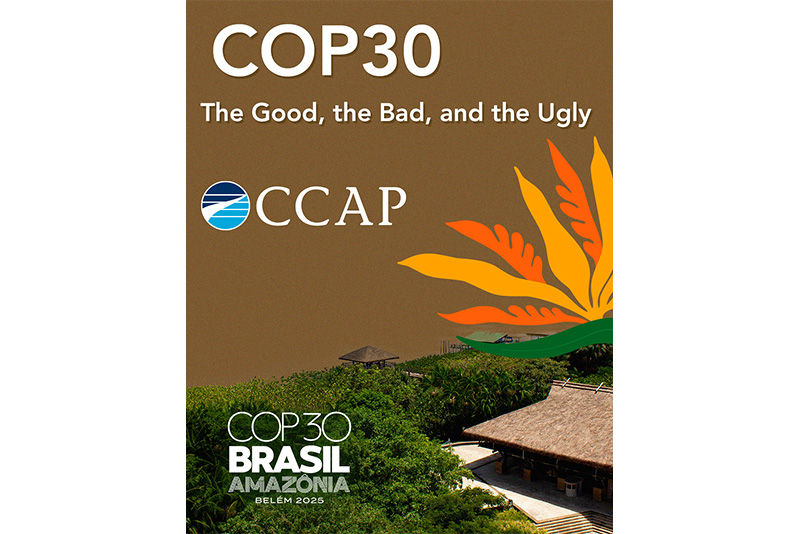Latin American Countries Will Not Wait to Take Climate Action
- Michael Comstock
- Jan 22, 2013
- 3 min read
At a press conference at the 18th Conference of the Parties to the United Nations Framework Convention on Climate Change (UNFCCC) in Doha, Omar Ramírez Tejada, Executive Vice President of the National Council on Climate Change and the Clean Development Mechanism (CNCCMDL) in the Dominican Republic and member of CCAP’s Mitigation Action Implementation Network (MAIN), made a statement that was heard throughout the halls of the Qatar National Convention Center. Amidst talk of the slow progress within the negotiation process, he announced that the Dominican Republic would reduce greenhouse gas (GHG) emissions to 25 percent below 2010 levels by 2020. Making the commitment even more noteworthy, is the Dominican Republic will proceed regardless of whether it receives international assistance. As an unconditional, absolute emissions-reduction pledge with a legal mandate – and this from a developing country – Mr. Ramírez’ announcement broke new ground in international climate policy.
The Dominican Republic has been strongly committed to climate mitigation and adaptation since the creation of the CNCCMDL in 2007. The country’s 2011 Plan of Climate-Compatible Economic Development (DECCC), which focuses on improving quality of life while reducing emissions in various sectors, identifies tourism, cement and waste as sectors where “rapid gains” can be made. Since the release of the DECCC, the country has stepped up its efforts on nationally appropriate mitigation actions (NAMAs) in each of these priority sectors. The CNCCMDL has engaged with CCAP and Environment Canada in an effort to reduce emissions from the country’s tourist destinations. It is also working with other non-governmental organizations and the government of Germany on a variety of climate mitigation projects, including improving waste management and switching fuels for cement kilns, among others.
The Dominican Republic wasn’t the only Latin American country to take ambitious steps toward mitigating climate change while at COP18. Six Latin American countries – Colombia, Costa Rica, Chile, Peru, Guatemala, and Panama – announced the creation of a new negotiating bloc, the Association of Independent Latin American and Caribbean States (AILAC), founded on the principal that “a strong and robust Convention is the most effective way to achieve the objective of a below-2-degree world” (ENB Doha Summary). These progressive countries, anxious for ambitious efforts, have begun to take decisive steps to reduce their emissions of GHGs, both unilaterally and with international support.
Costa Rica is a prime example of a country that has been zealously attacking climate change. In 2008, the country announced a plan to become carbon neutral. While other countries such as Norway, Iceland and New Zealand have declared similar goals, Costa Rica’s ambitious plan would make it the first country to achieve carbon neutrality by 2021. Costa Rica plans to target emission reductions across various sectors and sequester carbon in the country’s expanding forests. Land use is an area in which Costa Rica has already shown tremendous success, increasing the forested share from 21 percent in 1987 to 52 percent in the present day. This year the Ministry of the Environment announced a plan to reduce GHG emissions from the waste sector by 50 percent. Additionally, Costa Rica currently gets 94 percent of its electricity from renewable energy. The country is also making major strides on reducing emissions from the agricultural sector, in particular, coffee production.
Other countries that CCAP works with through MAIN are also taking significant actions to fight climate change. For example, Colombia, which is also part of the new negotiating bloc, aims to have 77 percent of its electricity generated from renewable sources by 2020 and to reduce Colombian Amazon deforestation to zero by the same date. The country is formulating NAMAs in the waste and transportation sectors with the potential to have a major impact on the country’s GHG emissions. Chile is working with CCAP on ambitious projects to dramatically increase the use of renewable energy, both on- and off-grid. Uruguay has established a goal of getting 50 percent of its total primary energy from renewable energy by 2015. Panama, Peru and Argentina have also been active in developing NAMAs in renewable energy, transport, agriculture, industrial processes, and solid waste management.
These countries are testament to the progress being made in Latin America on meaningful climate mitigation actions irrespective of what happens in the negotiating halls.





Comments